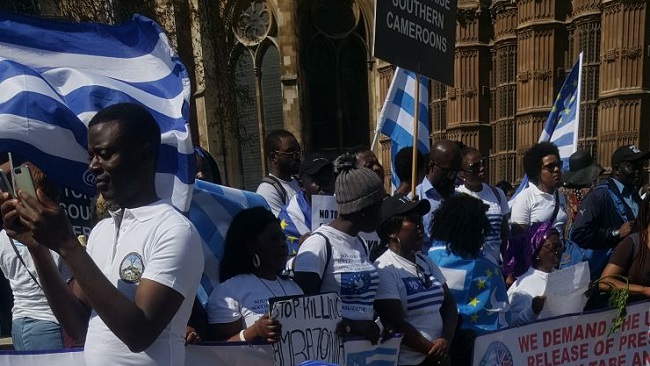Race and identity shaping US politics- Ukrainians got it. Southern Cameroonians didn’t
Looking at how swiftly the U.S. moved to grant temporary protections for Ukrainians living in the United States. Russia’s assault on Ukraine careens toward its third week.
Talks between the two nations continue, but how or when the Kremlin-led bombardment will end remains anyone’s guess.
The Russian invasion ignited a humanitarian crisis in Ukraine, particularly in major population centers receiving the brunt of attacks, including the capital city of Kyiv and the port city of Mariupol.
The International Organization for Migration, an arm of the United Nations, estimated the war has created nearly 3 million refugees who have fled the country since the conflict erupted on Feb. 24.
Temporary Protected Status, as its name suggests, is a short-term action and in this case will shield an estimated 75,000 Ukrainian nationals in the U.S., as of March 1, from deportation.
TPS is designated by the Department of Homeland Security for three main reasons: ongoing armed conflict, an environmental disaster or extraordinary temporary conditions that would make it impossible for nationals to return to their home countries.
“We in the Department of Homeland Security are acting in support of them,” said Secretary Secretary Alejandro Mayorkas in a video posted to Twitter on March 3 announcing the move. “Not just the Ukrainian people living in Ukraine, but also those here present in the United States.”
While no one can fault the Biden administration for its prompt action for the Ukraninans, many immigration advocates are taken aback by how quickly TPS came: a mere eight days after war erupted there.
“This was that aha moment, like OK, so you guys can make this decision in a matter of days,” said Haddy Gassama, an attorney based in Washington, D.C. “It should not take yearslong campaigns to establish proof that a certain country is too dangerous to deport people to.”
Gassama, who also serves as national director of policy and advocacy at UndocuBlack Network, which advocates on behalf of current and formally undocumented Black migrants, says countries like the central African nation of Cameroon also need TPS protections.
And after years of pushing, their efforts have yielded little results, which they say is disappointing for an administration that ran on a platform of rooting out inequities in federal agencies and programs.
Gassama added:
Haddy Gassama said: “I think what is a little bit jarring is that we did not expect that it would be such an uphill battle for a country that really should be a shoo-in."
Cameroon is in the midst of a conflict that goes back to 2016. The United Nations High Commission for Refugees from December found there were 1.5 million refugees and internally displaced people in Cameroon.
Should TPS be granted by the Biden administration, it would do nothing for those people in Cameroon. But without it, as is the case now, hundreds of Cameroonian nationals were deported by the Trump administration back to French Cameroun and have never been heard again and hundreds in the United States are at risk of being sent back to the current unstable conditions.
Advocates are also pushing for TPS action for Central American nations, including Honduras, El Salvador, and Nicaragua.
Culled from Politico.com





